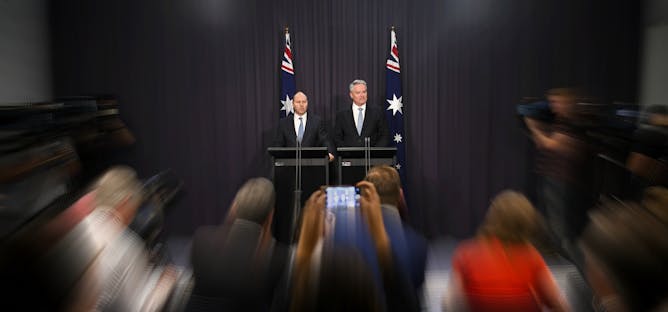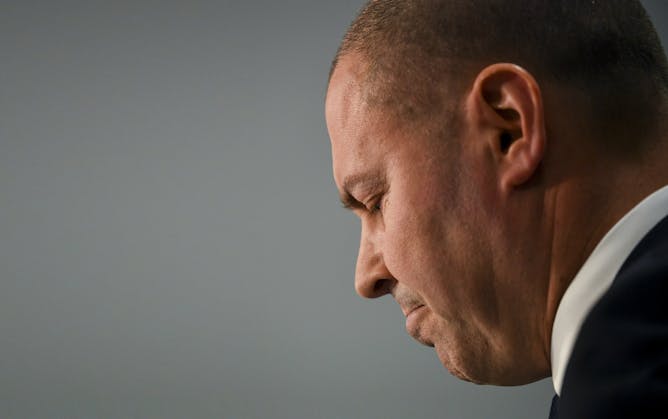|
|
|
Editor's note
|
|
Christmas has a way of crystallising reality.
On December 20 2012, five days before what would be his last Christmas as treasurer, Labor’s Wayne Swan called a press conference to admit what he had spent five years denying. The budget wasn’t going to return to surplus in 2012-13 after all.
“Obviously, dramatically lower tax revenue now makes it unlikely that there will be a surplus in 2012-13,” he said. “A sledgehammer hit our revenues.”
His Coalition successor, Josh Frydenberg, did much the same thing on Monday. Net government debt was not going to fall to zero over ten years as he had promised, the surplus was going to shrink rather than grow, economic growth was going to be much lower than he had previously forecast, and wage growth was going to begin with a “2” for the foreseeable future rather than the 3.5% every previous budget has promised for half a decade.
While welcome, the concessions might not go far enough.
This morning Danielle Wood points out that to achieve even the small and diminishing surpluses the government is continuing to promise, Frydenberg will have to cut real spending per person in each of the next four years, something that hasn’t been done since Labor’s Paul Keating was treasurer in the late 1980s and brought on the early 1990s recession.
Stephen Bartos a former deputy secretary in the Department of Finance, says the surplus projections also rely on taking no account of likely extra spending on the new government agency to be known as Services Australia, on aged care in response to the as-yet-uncompleted royal commission, and on what might be more frequent and costly disasters as a result of climate change.
In this morning’s podcast Michelle Grattan puts these questions, and questions about the state of the economy at year’s end, to Finance Minister Mathias Cormann and Shadow Treasurer Jim Chalmers.
P.S. If you’ve enjoyed The Conversation this year, consider donating today and helping safeguard quality journalism in 2020 and beyond. The best way you can support us is by a monthly donation of whatever you can afford.
|
Peter Martin
Section Editor, Business and Economy
|

|
|
Top stories
|

On one hand, we’re still able to forecast a surplus. On the other, conditions are deteriorating. Treasurer Frydenberg and Finance Minister Cormann deliver the news.
Lukas Coch/AAP
Danielle Wood, Grattan Institute; Kate Griffiths, Grattan Institute
MYEFO contains a long-overdue admission: that low wage growth is the new normal. It'll take extraordinary spending restraint to make the surplus forecasts stick.
|

If all goes well, Treasurer Josh Frydenberg might just deliver his tiny projected surpluses, but it isn’t clear why he should.
Lukas Coch/AAP
Stephen Bartos, Crawford School of Public Policy, Australian National University
The treasurer has pulled out all stops to continue to forecast budget surpluses, but they are low, and don't take account of several likely costs.
|

Volunteer firefighting crews have attempted to crowdfund equipment and supplies.
AAP Image/Supplied, DFES Incident Photographer Lewis van Bommel
Matthew Wade, Australian National University
Farmers seeking relief from the drought and firefighters stretched to their limits have turned to crowdfunding for help. But public appeal shouldn't replace good governance.
|

An illustration of the allegory of the cave from Plato’s Republic.
4edges/Wikimedia Commons
Matthew Sharpe, Deakin University
Plato's Republic is one of the most influential books in history. It has been claimed by people on all sides of the political spectrum and continues to resonate today.
|
Health + Medicine
|
-
Yasmine Probst, University of Wollongong; Vivienne Guan, University of Wollongong
With summer upon us, some people may be hoping to shed a few kilos. Although a quick-fix can be tempting, to keep the weight off in the longer term, here's how to steer clear of the fads.
-
Nicole Lee, Curtin University
New draft guidelines recommend limiting alcohol consumption to no more than ten standard drinks per week and no more than four standard drinks on any one day.
|
|
Education
|
-
Philip Roberts, University of Canberra
Some subjects are more likely to get you into university. But more advantaged students access these subjects. This means we have an unequal system.
|
|
Environment + Energy
|
-
Maria Tanyag, Australian National University; Jacqui True, Monash University
COP25 has come and gone, another missed opportunity to use women's knowledge to mitigate climate change.
-
Don Driscoll, Deakin University; David M Watson, Charles Sturt University; Euan Ritchie, Deakin University
Rapid action is needed to reduce feral horse numbers before they cause more damage to native species.
-
Kate Dooley, University of Melbourne
Earth has only a few chances to avert catastrophic climate change. At the COP25 in Madrid, we blew one of them.
|
|
|
|
Science + Technology
|
-
Jessica McLean, Macquarie University
Last year, it was estimated data centres around the world generated the same amount of carbon emissions as created by the global airline industry's fuel usage.
-
Roberto Musotto, Edith Cowan University; David S. Wall, University of Leeds
Facebook is planning to put end-to-end encryption on all its messaging services soon. But governments aren't happy about it, as it could make it harder to catch criminals.
|
|
Business + Economy
|
-
Michelle Grattan, University of Canberra
The figures indicate a worsening economy, but the government has sought to put a positive spin on the situation, saying the Australian economy is showing resilience.
-
Michelle Grattan, University of Canberra
The projected surplus has been revised down from A$7.1 billion at budget time to $5 billion for this financial year.
|
|
Politics + Society
|
-
Freya Higgins-Desbiolles, University of South Australia; James Higham, University of Otago
The tragedy at Whakaari/White Island highlights the need for consent forms to ensure tourists are fully informed when choosing to visit dangerous locations.
|
|
| |
Featured jobs
|
|
|
Featured events
|

|
Kolling Institute of Medical Research, Kolling Auditorium, Level 5, Building 6, Royal North Shore Hospital, 10 Westbourne Street , St Leonards, New South Wales, 2064, Australia — University of Sydney
|
|
|
|
| |
| |
| |
| |
| |
|
|
|
|
|
|
|